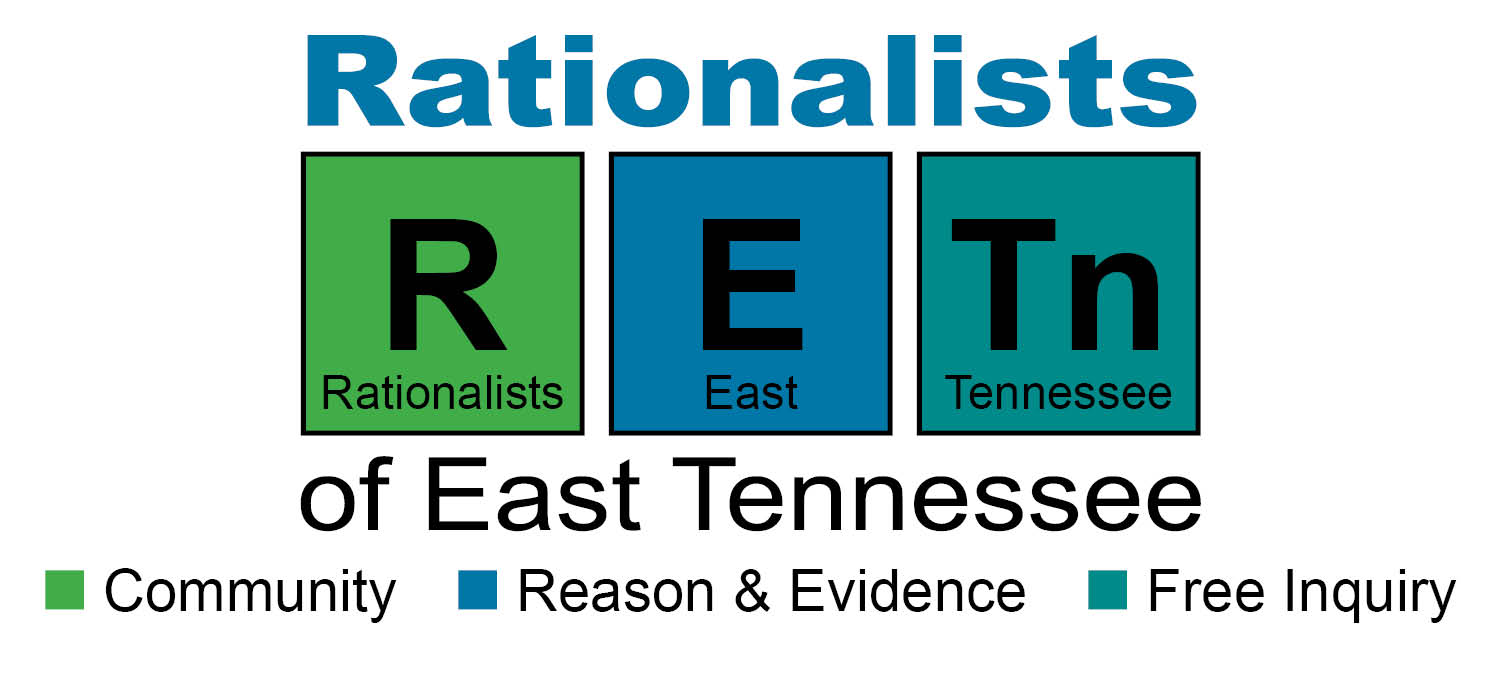As part of our commitment to action, members are encouraged to write letters for publication in local area newspapers. Our reality, reason, and skeptic orientation are frequently needed in addressing local affairs and opinions. The subject can be whatever triggers a response by a member. Where possible we will include a copy of the stimulus letter or news item, the response, and any backup material. Readers are encouraged to respond via email to info@rationalists.org.
Editor, the News-Sentinel:
A March 29 letter to the editor ("Principles aren't whims") criticized the humanistic principles held by members of the Rationalists of East Tennessee. Its author wondered if morals of secular folks are based on whims (Webster defines a whim as "the sudden turn or start of the mind"). On the contrary, the ethical framework of a rational thinker is based on well-reasoned and tested principles (opposite of whim).
What I didn't understand, however, was why the author, who was trying to make an argument against humanism, mentioned Nazis (who, by the way, wore "God is with us" on their belts), Stalinism, China and other nonhumanist regimes. Why didn't he mention atrocities committed by other nonhumanist groups such as the Christian crusades, the Taliban, the United States dropping the A-bomb on civilians, the Spanish inquisition, Protestants vs. Catholics in Ireland, pilgrims slaughtering Native Americans, etc?
Actually, the author would have had a better argument if he had produced a single example of an evil humanist regime killing or enslaving people. I challenge him.
Also, I'm stumped as to why he thinks the Rationalists of East Tennessee believe that moral and ethical principles should be decided by those who are the strongest and wealthiest. Neither rationalists nor humanists have posited such a principle.
The author was correct, however, that rationalists and humanists uphold moral ideals "because they are basic requirements for a civilized society." How else should we? His letter didn't mention an alternative.
Dave Buck
President, Rationalists of East Tennessee
Knoxville
Editor, the News-Sentinel:
A recent letter to the editor has expressed the view that rationalism and humanism are responsible for Nazism, communism and various dictatorial actions of governments that stifle freedom of the individual. The Council for Secular Humanism lists 21 statements of principles; all of them are contrary to totalitarianism in any form.
Two of the positions are the following: "We believe in the fullest realization of the best and noblest that we are capable of as human beings" and "We believe in the common moral decencies: altruism, integrity, honesty, truthfulness, responsibility. Humanistic ethics is amenable to critical, rational guidance. There are normative standards that we discover together. Moral principles are tested by their consequences."
It is difficult to imagine how anyone who has actually read these principles could consider them threatening to his freedom. Nazism and communism are usually classified as pseudo-religions because they embrace sacred texts (Mein Kampf, The Communist Manifesto), have many prophets and pay homage to quasi-deified founders (Hitler, Marx, Lenin). They are authoritative, as are religions, and promise punishment for those who do not strictly adhere to doctrine.
No such doctrinaire controls are to be found in secular humanism. It is a philosophy that affirms the right of everyone to live a full, creative life within the bounds of total ethical treatment of his fellow man.
Society should be much more apprehensive about its members who require constraint through fear of a supernatural god than those members whose morality springs from a desire to enhance the well-being of both individuals and humankind in general.
Ralph C. Isler
Oak Ridge
Editor, the News-Sentinel:
I was astounded and saddened by a letter concerning the ad that the Rationalists of East Tennessee recently placed in the News-Sentinel in which they explain why one can be moral without belief in a supernatural being. As a rationalist, I think morality emerges from a natural empathy for fellow human beings (the result of evolution as a social species), which needs to be supplemented by rationality to cope with situations that nature had not foreseen.
The letter writer suggests that this approach leads to all sorts of evils, from Hitler to the lack of a pension fund. Unfortunately, he neglects to advance even a tenuous argument that connects rational ethics to the killings of Stalin and ignores that most of our best philosophers, for example Aristotle, Kant and John Stuart Mill, were rational ethicists.
The writer asks whose moral and ethical principles rationalists plan to use to achieve their goals, apparently ignoring that we think that these principles are universal for primate societies and so are nobody's in particular and are certainly not decided by committee.
Even more appallingly, the writer implies that the "real" foundation for morality has to come from religious belief. While there are of course innumerable people who are moral and religious, the two are hardly logically linked.
For every Stalin or Hitler who used unbelief as a tool of domination, I can cite a Torquemada (Spanish Inquisition), one of the innumerable crusaders, the many "leaders" that continue the Israeli-Palestinian bloodbaths, Bin Laden and the perpetrators of Sept. 11 and on and on as examples of where the solid religious foundations of morality can lead.
Massimo Pigliucci
Knoxville
Editor, the News-Sentinel:
A recent letter attacking the Rationalists of East Tennessee revealed a significant amount of ignorance and/or misrepresentation by the writer. His claims are amazing.
To begin, I will merely list some of the misrepresentations. Humanists have historically been at the forefront of human dignity and human rights. Humanists are strong supporters of democratic government. The Chinese government is not and the Soviet government was not based on humanistic principles.
The vast majority of Nazis were Christians, and Hitler even claimed that he was following God's will. Ethics and morality are a very important part of the humanistic world view. Ethics is a serious subject for humanists and not based on whims, as the writer claims.
Our ethical and moral approaches are based on very important and real principles. The importance of justice, fairness and compassion to humanists cannot be significantly addressed in a letter. For the same reason, I won't even try to address the writer's political claims in this letter.
To protect all humans from the abuse of the strongest, wealthiest and most powerful is at the very core of humanism. I have no idea where the writer's claims came from, but they contrary to the truth.
One should not attack the morality of others by misrepresenting them. That is a principle, not a whim.
Carl Ledendecker
Louisville, Tenn.

